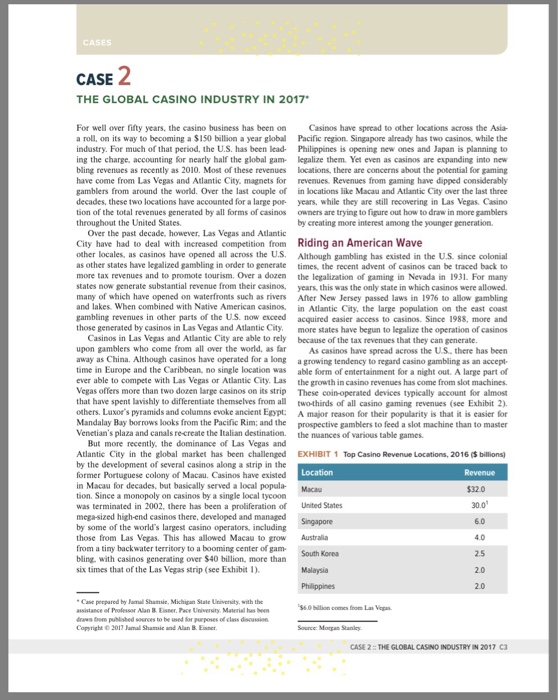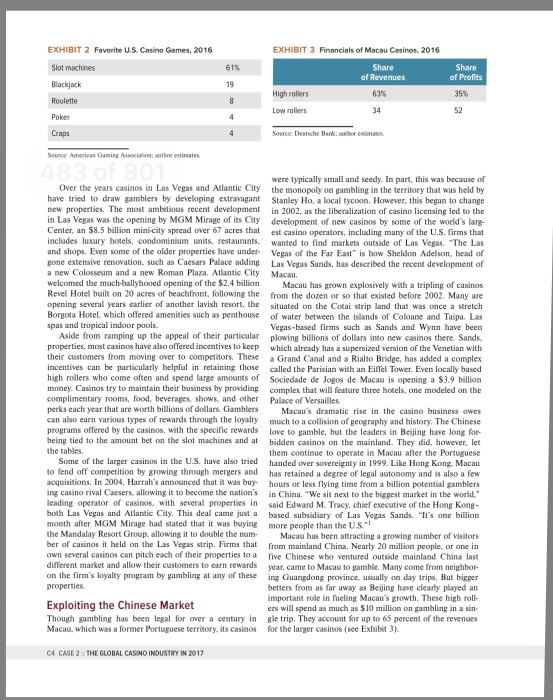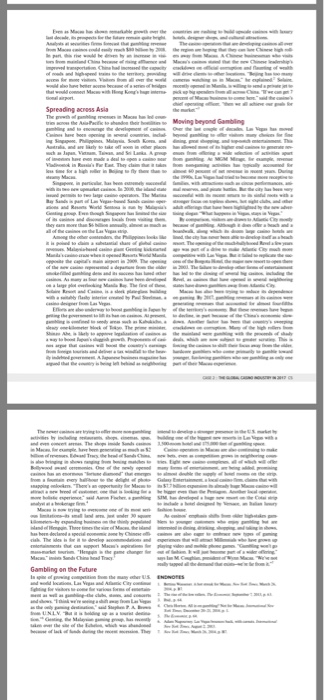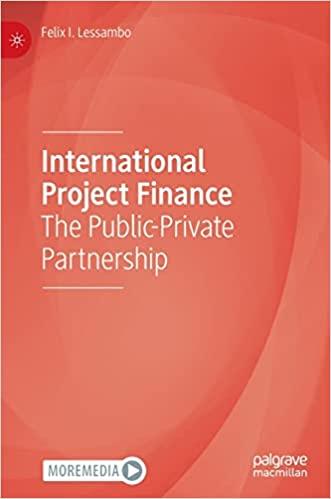CASES CASE 2 THE GLOBAL CASINO INDUSTRY IN 2017 For well over fifty years, the casino business has been on Casinos have spread to other locations across the Asia a roll, on its way to becoming a $150 billion a year global Pacific region. Singapore already has two casinos, while the industry. For much of that period, the U.S. has been lead Philippines is opening new ones and Japan is planning to ing the charge, accounting for nearly half the global gam legalize them. Yet even as casinos are expanding into new bling revenues as recently as 2010. Most of these revenues locations, there are concerns about the potential for gaming have come from Las Vegas and Atlantic City, magnets for revenues. Revenues from gaming have dipped considerably gamblers from around the world. Over the last couple of in locations like Macau and Atlantic City over the last three decades, these two locations have accounted for a large por years, while they are still recovering in Las Vegas. Casino tion of the total revenues generated by all forms of casinos oners are trying to figure out how to draw in more gamblers throughout the United States by creating more interest among the younger generation. Over the past decade, however, Las Vegas and Atlantic City have had to deal with increased competition from Riding an American Wave other locales, as casinos have opened all across the U.S. Although gambling has existed in the U.S. since colonial as other states have legalized gambling in order to generate times, the recent advent of casinos can be traced back to more tax revenues and to promote tourism. Over a dozen the legalization of gaming in Nevada in 1931. For many states now generate substantial revenue from their casinos. years, this was the only state in which casinos were allowed. many of which have opened on waterfronts such as rivers After New Jersey passed laws in 1976 to allow gambling and lakes. When combined with Native American gambling revenues in other parts of the US. now exceedacquired casier access to casinos. Since 1988, more and those generated by casinos in Las Vegas and Atlantic City. more states have begun to legalize the operation of casinos casinos, in Atlantic City, the large population on the east coast Casinos in Las Vegas and Atlantic City are able to rely because of the tax revenues that they can generate. upon gamblers who come from all over the world, as farAs casinos have spread across the US. there has been away as China. Although casinos have operated for a long a growing tendency to regard casino gambling as an accept time in Europe and the Caribbean, no single location was able orm of entertainment for a night out. A large part of ever able to compete with Las Vegas or Atlantic City. Las the growth in casino revenues has come from slot machines. Vegas offers more than two dozen large casinos on its strip These coin-operated devices typically account for almost that have spent lavishly to differentiate themselves from alltwo-thirds of all casino gaming revenues (see Exhibit 2). others. Luxors pyramids and columns evoke ancient Egypt: A major reason for their popularity is that it is easier for Mandalay Bay borrows looks from the Pacific Rim; and the Venetian's plaza and canals re-create the Italian destination. the nuances of various table games prospective gamblers to feed a slot machine than to master But more recently, the dominance of Las Vegas and Atlantic City in the global market has been challenged EXHIBIT 1 Top Casino Revenue Locations, 2016($ billions by the development of several casinos along a strip in the former Portuguese colony of Macau. Casinos have existed in Macau for decades, but basically served a loal popula Msca tion. Since a monopoly on casinos by a single local tycoon was terminated in 2002, there has been a proliferation of United States mega-sized high-end casinos there, developed and managed by some of the world's largest casino operators, including those from Las Vegas. This has allowed Macau togro Australia from a tiny backwater territory to a booming center of gam- bling, with casinos generating over $40 billion, more than six times that of the Las Vegas strip (see Exhibit 1) Location Revenue South Korea Case peepared by Jamal Shamsie, Michigan State Univenity, with the assistance of Professor Alan B Esner, Pace University Material has be raw m published soerces to be used for purposes o class disussion Coppright 2017 Jamal Shammie and Alan B Eisner $60 billion comes from La Vagas Sounce: Mogan Stanley CASE 2 THE GLOBAL CASINO INDUSTRY IN 2017 C3










